Posté par Pascale Dubus, le 3 juillet 2013;
- Date limite : 27 septembre 2013
- Date et lieu du colloque : 13-15 juillet 2014, Université de Southampton
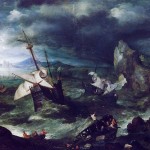 Society for Renaissance Studies 6th Biennial Conference Centre for Medieval and Renaissance Culture University of Southampton, 13-15 July 2014 Society for Renaissance Studies 6th Biennial Conference Centre for Medieval and Renaissance Culture University of Southampton, 13-15 July 2014
The conference theme is ‘Performative Spaces’. Renaissance scholars from the disciplines of archaeology, architecture, history of art, history, history of science and medicine, literature, music, philosophy and other fields are invited to submit proposals for panels (90 mins), and individual papers (20 mins), that engage with ‘Performative Spaces’ :
• as liturgical or religious performances;
• by addressing the ways objects were intended to tell stories;
• as processions, rituals, and ceremonies;
• as houses, and through building design;
• by exploring diplomatic and political spaces;
• as . . . → En lire plus
Posté par Pascale Dubus, le 2 juillet 2013;
- Date limite : 15 Août 2013
- Date et lieu du séminaire : 3-4 octobre 2013, Université de Toronto, Collège St. Michael
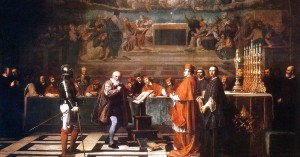 Le but de ce colloque est double : (i) rassembler les chercheurs intéressés à revisiter la pensée de Galilée sur la relation entre science et foi, et à explorer ses réflexions sur les arts, le langage et l’esthétique, en particulier — mais pas exclusivement — dans le contexte de cette relation, et (ii) confronter ses idées avec leur représentation dans les arts depuis le XVIIe siècle, y compris la littérature, le théâtre, la peinture, la musique et le cinéma. Parmi les sujets de discussion, ceux qui traitent des idées et des circonstances qui ont mené au procès de Galilée à Rome sont particulièrement bienvenus. Mais . . . → En lire plus Le but de ce colloque est double : (i) rassembler les chercheurs intéressés à revisiter la pensée de Galilée sur la relation entre science et foi, et à explorer ses réflexions sur les arts, le langage et l’esthétique, en particulier — mais pas exclusivement — dans le contexte de cette relation, et (ii) confronter ses idées avec leur représentation dans les arts depuis le XVIIe siècle, y compris la littérature, le théâtre, la peinture, la musique et le cinéma. Parmi les sujets de discussion, ceux qui traitent des idées et des circonstances qui ont mené au procès de Galilée à Rome sont particulièrement bienvenus. Mais . . . → En lire plus
Posté par Sébastien Bontemps, le 26 juin 2013;
- Date et lieu du colloque : 10-12 avril 2014, London, College of Art
- Date limite : 11 novembre 2013
 Association of Art Historians 40th Anniversary Conference, Royal College of Art, London, 10-12 April 2014 Association of Art Historians 40th Anniversary Conference, Royal College of Art, London, 10-12 April 2014
Museums & Exhibitions Group Annual Session
Challenging conventions: Exploring hierarchies within the historiography of the fine and decorative arts.
This session explores hierarchies within the discipline of art history, tracing the separation of the ‘fine’ and ‘decorative/applied’ arts and examining the impact of this division on the research, display and use of art objects within academic and museum contexts. Even before Kant subdivided the arts into ‘mechanical’ and ‘aesthetic’ groupings, the ‘decorative’ arts were somehow deemed lesser due to their inherent functionality, allied to base manual labour and divorced from the purity and higher appeal/role of the ‘fine’ arts. This approach was perpetuated throughout . . . → En lire plus
Posté par Damien Bril, le 22 juin 2013;
Sabine Frommel et Juliette Dumas (éd.), Bâtir au féminin ? Traditions et stratégies en Europe et dans l’Empire ottoman. Paris, Picard, 2013.
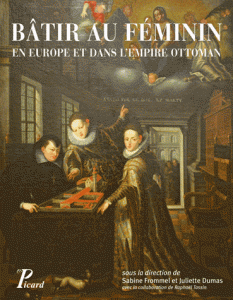 Bâtir au féminin sonne comme une provocation pour l’époque moderne, tant la place des femmes dans le domaine du patronage architectural peut sembler limitée entre le XVe et le XVIIIe siècle. Pourtant, si l’Europe chrétienne et l’Empire ottoman musulman se retrouvent dans une distribution sexuée des rôles – aux hommes revient l’implication dans la vie publique et politique, aux femmes l’action dans la sphère domestique –, de notables exceptions sont admises pour les femmes de l’élite, notamment quand elles appartiennent aux maisons régnantes. Les contributions regroupées dans ce volume se . . . → En lire plus Bâtir au féminin sonne comme une provocation pour l’époque moderne, tant la place des femmes dans le domaine du patronage architectural peut sembler limitée entre le XVe et le XVIIIe siècle. Pourtant, si l’Europe chrétienne et l’Empire ottoman musulman se retrouvent dans une distribution sexuée des rôles – aux hommes revient l’implication dans la vie publique et politique, aux femmes l’action dans la sphère domestique –, de notables exceptions sont admises pour les femmes de l’élite, notamment quand elles appartiennent aux maisons régnantes. Les contributions regroupées dans ce volume se . . . → En lire plus
Posté par Leonard Pouy, le 18 juin 2013;
- Date limite : 31 juillet 2013
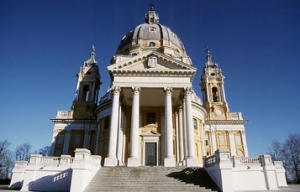 « Fondazione 1563 per l’art e la cultura » in the framework of the « Study Program on the Age and the Culture of Baroque » launches a call for applications for five fellowships for university graduates under 38 years of age, on the theme : CULTURE, ART AND SOCIETY IN THE TIMES OF JUVARRA « Fondazione 1563 per l’art e la cultura » in the framework of the « Study Program on the Age and the Culture of Baroque » launches a call for applications for five fellowships for university graduates under 38 years of age, on the theme : CULTURE, ART AND SOCIETY IN THE TIMES OF JUVARRA
The application deadline is 31 July 2013.
Applications forms available at www.fondazione1563.it
To be sent to info@fondazione1563.it
http://f.hypotheses.org/wp-content/blogs.dir/361/files/2013/05/locandina-bando-barocco.pdf
Posté par Leonard Pouy, le 18 juin 2013;
- Date et lieu : 27-29 mars 2014, Rome
- Date limite : 30 septembre 2013
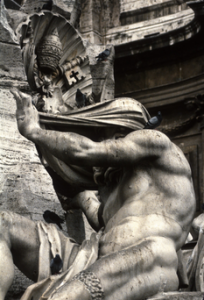 Society and Culture in the Baroque Period, Rome, 27-29 mars 2014 Society and Culture in the Baroque Period, Rome, 27-29 mars 2014
In March 2014, Rome will host the final conference of ENBaCH (European Network for Baroque Cultural Heritage), a project which kicked off in June 2009 and will end in May 2014.
The aim of this conference will be not only to discuss the research results produced by the eight project partners, but also to serve as an opportunity for a multidisciplinary meeting of groups and individual researchers studying the Baroque Period from every possible perspective: from politics to literature, from society to art and from music to science.
The key word envisioned in our approach is . . . → En lire plus
Posté par Pascale Dubus, le 17 juin 2013;
- Date limite : 1er décembre 2013
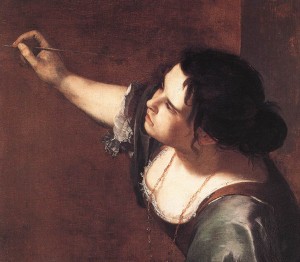 The Italian schools occupied central positions in early modern art collections, a tradition that continued through the 19th and 20th centuries. The primacy of Italian art became a cornerstone for museum practice as well as a founding principle for the nascent art history discipline. This issue takes a closer look at the beginning of this tradition in the 17th and 18th century. Since the 1960s (and before), scholars have taken an interest in the Grand Tours of princes, aristocrats and connoisseurs. More recent research has added to the picture by discussing the collecting activities of artists, architects, diplomats, dealers and scholars, . . . → En lire plus The Italian schools occupied central positions in early modern art collections, a tradition that continued through the 19th and 20th centuries. The primacy of Italian art became a cornerstone for museum practice as well as a founding principle for the nascent art history discipline. This issue takes a closer look at the beginning of this tradition in the 17th and 18th century. Since the 1960s (and before), scholars have taken an interest in the Grand Tours of princes, aristocrats and connoisseurs. More recent research has added to the picture by discussing the collecting activities of artists, architects, diplomats, dealers and scholars, . . . → En lire plus
Posté par Pascale Dubus, le 12 juin 2013;
- Date limite : 15 juillet 2013
- Date et lieu du colloque : 19-21 juin 2014, Paris, Centre André Chastel, INHA
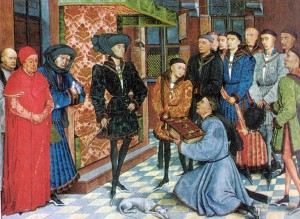
Ce colloque vise à interroger la place de l’artiste / artisan à la fin du Moyen Âge et au début de l’époque moderne dans divers contextes sociaux, en particulier à la ville et / ou à la cour, au sein des corporations et / ou dans l’hôtel du prince. Un certain nombre d’artistes ont répondu à des commandes dans ces deux sphères habituellement jugées distinctes, tels Jean Fouquet, Rogier van der Weyden, Albrecht Dürer, Hans Plock, Jacques Jordaens . . . → En lire plus
Posté par Sébastien Bontemps, le 6 juin 2013;
- Date et lieu du colloque : 19-20 juin 2013 - Paris, INHA (Auditorium, Salle Ingres)
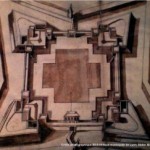 Si les ingénieurs du Roi des XVIIe et XVIIIe siècles ont fait l’objet d’études approfondies, notamment autour de la figure emblématique de Vauban, leurs prédécesseurs restent les grands oubliés de l’histoire française des fortifications. Pourtant, ces « précurseurs » jouèrent un rôle fondamental dans la diffusion des idées et des techniques. Parmi eux, se détache un nombre conséquent d’ingénieurs italiens entrés au service du roi de France. Venant pour la plupart de la République de Florence, des Etats pontificaux et plus tard du duché de Milan, actifs dans toutes les zones de conflits des débuts de l’époque moderne, ils se démarquent par leur polyvalence, leur goût pour l’invention et leur maîtrise du dessin, à l’origine de la réputation d’artistes-ingénieurs, . . . → En lire plus Si les ingénieurs du Roi des XVIIe et XVIIIe siècles ont fait l’objet d’études approfondies, notamment autour de la figure emblématique de Vauban, leurs prédécesseurs restent les grands oubliés de l’histoire française des fortifications. Pourtant, ces « précurseurs » jouèrent un rôle fondamental dans la diffusion des idées et des techniques. Parmi eux, se détache un nombre conséquent d’ingénieurs italiens entrés au service du roi de France. Venant pour la plupart de la République de Florence, des Etats pontificaux et plus tard du duché de Milan, actifs dans toutes les zones de conflits des débuts de l’époque moderne, ils se démarquent par leur polyvalence, leur goût pour l’invention et leur maîtrise du dessin, à l’origine de la réputation d’artistes-ingénieurs, . . . → En lire plus
Posté par Pascale Dubus, le 5 juin 2013;
- Date limite : 31 juillet 2013
- Date et lieu du colloque : 5 octobre 2013, Florence, Biblioteca Domenicana
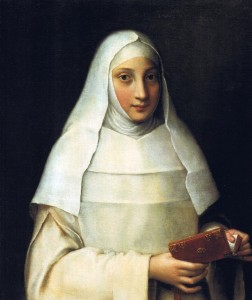 Co-sponsored by the Medici Archive Project’s Jane Fortune Research Program on Women Artists and the Biblioteca Domenicana in Santa Maria Novella, this conference highlights new research on artistic production in female monastic communities since the early Renaissance until the Napoleonic suppression. Co-sponsored by the Medici Archive Project’s Jane Fortune Research Program on Women Artists and the Biblioteca Domenicana in Santa Maria Novella, this conference highlights new research on artistic production in female monastic communities since the early Renaissance until the Napoleonic suppression.
Demolishing older notions of enclosure as an absolute barrier between nuns and the world outside, recent research on social and religious aspects has begun to reinsert the convent within the wider networks of patronage and economic life in the early modern state, and to reposition it within larger civic and ecclesiastical discourses. Presumably this model can also be applied to . . . → En lire plus
Posté par Pascale Dubus, le 3 juin 2013;
- Date et lieu du colloque : 13-14 novembre 2014, Londres, The Warburg Institute
- Date limite : 31 juillet 2013
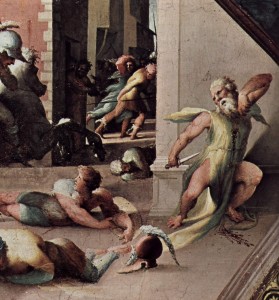 Early modern Europe found new fascination in the classical past, but how that past was conceived varied widely. This conference will explore diverse notions of antiquity across Europe in the early modern era, challenging assumptions about a Greco-Roman past and a ‘Renaissance’ that were both universal and monolithic. It is already well known that multiple ‘antiquities’ informed the artistic and literary culture of Rome, Florence and Venice and much recent work has been done on the reception of antiquity in France, Germany and the Netherlands. Our conference will consider how this research has fundamentally changed the perception of European . . . → En lire plus Early modern Europe found new fascination in the classical past, but how that past was conceived varied widely. This conference will explore diverse notions of antiquity across Europe in the early modern era, challenging assumptions about a Greco-Roman past and a ‘Renaissance’ that were both universal and monolithic. It is already well known that multiple ‘antiquities’ informed the artistic and literary culture of Rome, Florence and Venice and much recent work has been done on the reception of antiquity in France, Germany and the Netherlands. Our conference will consider how this research has fundamentally changed the perception of European . . . → En lire plus
Posté par Damien Bril, le 29 mai 2013;
- Date et lieu de la table ronde : 1er juin 2013, Fontainebleau
Table ronde modérée par Sabine Frommel (EPHE) avec Howard Burns (Scuola Normale di Pisa), Frédéric Hitzel (EHESS), Olga Medvedkova (CNRS), Pierre Pinon (ENSA de Paris-Belleville)
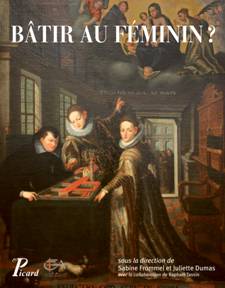 En Orient comme en Occident, l’art de bâtir constitua un moyen privilégié pour les femmes de rivaliser avec les hommes sur la scène officielle et pour établir une stratégie visuelle qui permette aux reines, régentes et princesses de glorifier leurs origines, leur identité ou leur statut. Des confrontations mettent en lumière les écarts mais aussi les analogies entre l’Europe et l’Empire ottoman, rendant possible une meilleure compréhension des traditions orientales et occidentales susceptible d’approfondir le dialogue entre celles-ci. En Orient comme en Occident, l’art de bâtir constitua un moyen privilégié pour les femmes de rivaliser avec les hommes sur la scène officielle et pour établir une stratégie visuelle qui permette aux reines, régentes et princesses de glorifier leurs origines, leur identité ou leur statut. Des confrontations mettent en lumière les écarts mais aussi les analogies entre l’Europe et l’Empire ottoman, rendant possible une meilleure compréhension des traditions orientales et occidentales susceptible d’approfondir le dialogue entre celles-ci.
Table ronde samedi 1er juin
De 10h30 à 11h30
Espace rencontres du Salon du livre . . . → En lire plus
Posté par ingrid falque, le 29 mai 2013;
- Date et lieu du colloque : 20-22 juin 2013, Pays-Bas, Leiden University Library.
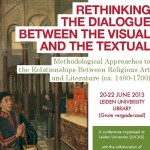 In recent decades, the interactions between religious art(s) and literature(s) in the Late Middle Ages and Early Modern Period have been an important area of study for many scholars. More particularly, the study of the interconnectedness of texts and images and of the contact zones between visual arts and literature constitutes an emerging field that is particularly stimulating for both art historians and historians of literature. These scholarly interests generate a range of general methodological and theoretical questions: how can a text be used to understand an image ? How can an image help to discern the meaning of a text? How do we interpret texts and images together in order to understand the religious culture of these periods? . . . → En lire plus In recent decades, the interactions between religious art(s) and literature(s) in the Late Middle Ages and Early Modern Period have been an important area of study for many scholars. More particularly, the study of the interconnectedness of texts and images and of the contact zones between visual arts and literature constitutes an emerging field that is particularly stimulating for both art historians and historians of literature. These scholarly interests generate a range of general methodological and theoretical questions: how can a text be used to understand an image ? How can an image help to discern the meaning of a text? How do we interpret texts and images together in order to understand the religious culture of these periods? . . . → En lire plus
Posté par Leonard Pouy, le 29 mai 2013;
- Date limite : 15 septembre 2013
- Date et lieu du colloque : 11-13 septembre 2014, Bruges.
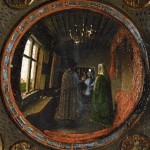 In preparation of the XIXth Symposium for the Study of Underdrawing and Technology in Painting to be held at Bruges, 11-13 September 2014, UCL (Louvain-la-Neuve), the Laboratoire d’Étude des œuvres d’art par les méthodes scientifiques (Musée de Louvain-la-Neuve) and Musea Brugge, in conjunction with the Royal Institute for Cultural Heritage (Brussels), its Centre for the study of the Flemish primitives, and Illuminare (Centre for the Study of Medieval Art, KULeuven), invite you to submit an abstract on the theme : In preparation of the XIXth Symposium for the Study of Underdrawing and Technology in Painting to be held at Bruges, 11-13 September 2014, UCL (Louvain-la-Neuve), the Laboratoire d’Étude des œuvres d’art par les méthodes scientifiques (Musée de Louvain-la-Neuve) and Musea Brugge, in conjunction with the Royal Institute for Cultural Heritage (Brussels), its Centre for the study of the Flemish primitives, and Illuminare (Centre for the Study of Medieval Art, KULeuven), invite you to submit an abstract on the theme :
Technical Studies of paintings: problems of attribution (15th-17th century)
Attribution is a central question in art history. Since the introduction of new examination techniques such . . . → En lire plus
Posté par Pascale Dubus, le 27 mai 2013;
- Date limite : 21 juin 2013
- Date et lieu du colloque : Samedi 26 octobre 2013 , Londres, The Courtauld Institute of Art.
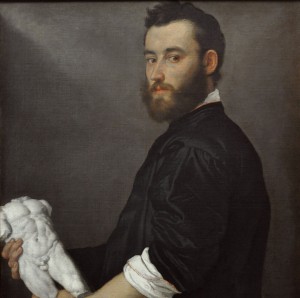 Did I request thee, Maker, from my Clay To mould me Man? Did I solicit thee From darkness to promote me? Did I request thee, Maker, from my Clay To mould me Man? Did I solicit thee From darkness to promote me?
John Milton, Paradise Lost, Book X (1667)
Complex narratives spanning months, years or even decades exist behind the single bracketed date attached to artworks to indicate their moment of execution or completion.This one-day symposium will explore the ‘ante-natal’ development of early modern art from its conception to its ‘quickening’ and eventual birth. The process fascinated contemporary theorists and continues to raise questions for modern art historians. For example, when was an . . . → En lire plus
Posté par Zinaïda Polimenova, le 24 mai 2013;
- Date et lieu de la journée d'étude : 13-14 juin 2013, Paris, INHA.
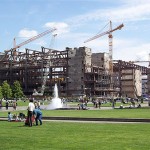 Où se cache l’oubli dans la fabrication du patrimoine ? Où se cache l’oubli dans la fabrication du patrimoine ?
Journées d’études doctorales 13 et 14 juin 2013, INHA, Galerie Colbert, salle Jullian Centre de recherche HiCSA, université Paris 1 Panthéon-Sorbonne
Ces journées entendent étudier des objets, des monuments ou des traditions du patrimoine dont une partie de l’histoire a été passée sous silence, volontairement ou involontairement, voire cachée. Il s’agit également d’étudier les parcours de différents acteurs qui ont contribué ensuite à faire (ré)apparaître ces objets oubliés ou en devenir. La question de l’oubli s’inscrit entre destruction et sauvegarde d’un patrimoine. Elle met en évidence un processus de patrimonialisation qui est le résultat de tensions liées tantôt à des conflits, . . . → En lire plus
Posté par Leonard Pouy, le 20 mai 2013;
- Date limite : 15 juin 2013
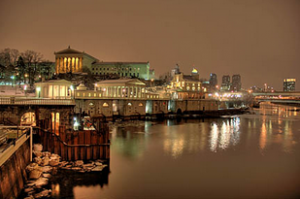 The Philadelphia Museum of Art seeks candidates for a one year fellowship in interpretation, beginning September 2013 and ending August 2014. This Kress Interpretive Fellow, supported by a grant from the Samuel H. Kress Foundation, will work collaboratively with Museum curators, educators, and conservators to create new interpretive strategies for selected works from the Museum’s collection of northern European painting from the 15th to the 17th centuries. The Fellow will have access to relevant collections and to the Museum’s library, and will partake of all professional privileges extended to Museum staff. The Philadelphia Museum of Art seeks candidates for a one year fellowship in interpretation, beginning September 2013 and ending August 2014. This Kress Interpretive Fellow, supported by a grant from the Samuel H. Kress Foundation, will work collaboratively with Museum curators, educators, and conservators to create new interpretive strategies for selected works from the Museum’s collection of northern European painting from the 15th to the 17th centuries. The Fellow will have access to relevant collections and to the Museum’s library, and will partake of all professional privileges extended to Museum staff.
Reporting jointly to the Associate Curator of European Painting & Sculpture before 1900 and the Senior . . . → En lire plus
Posté par Matthieu Lett, le 20 mai 2013;
- Date et lieu de la journée d'études : 22-23 mai 2013, Dijon
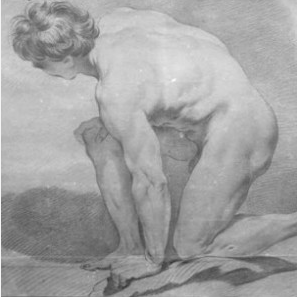 Dans la première phase du programme Faber sur l’Académie de peinture et de sculpture de Dijon (1766-1799) sont organisées trois journées d’études : sur les dessins d’académies, sur l’enseignement du dessin et sur l’histoire des académies. Ces journées sont conçues comme des lieux d’échanges et de réflexion pour faire un état des méthodes et approches actuelles, et voir comment on peut les mettre en œuvre (ou créer des outils appropriés) dans le cas de l’académie de Dijon au XVIIIe siècle. Après un premier atelier sur les dessins d’académies en tant que tel (10-11 janvier 2013), ces journées sont centrées sur l’enseignement pratique du dessin au sein des . . . → En lire plus Dans la première phase du programme Faber sur l’Académie de peinture et de sculpture de Dijon (1766-1799) sont organisées trois journées d’études : sur les dessins d’académies, sur l’enseignement du dessin et sur l’histoire des académies. Ces journées sont conçues comme des lieux d’échanges et de réflexion pour faire un état des méthodes et approches actuelles, et voir comment on peut les mettre en œuvre (ou créer des outils appropriés) dans le cas de l’académie de Dijon au XVIIIe siècle. Après un premier atelier sur les dessins d’académies en tant que tel (10-11 janvier 2013), ces journées sont centrées sur l’enseignement pratique du dessin au sein des . . . → En lire plus
Posté par Damien Bril, le 15 mai 2013;
E. Hénin, F. Lecercle, L. Wajeman (éd.), La théorie subreptice. Les anecdotes dans la théorie de l’art (XVIe-XVIIIe siècles), Turnhout, Brepols (collection Théorie de l’art), 2012.
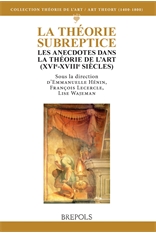 La théorie de l’art s’est largement constituée par le récit : c’est le cas dans l’Antiquité, où elle s’est développée par le biais de fragments biographiques dont certaines ont eu à travers les siècles un succès retentissant. Le recueil Millet, qui rassemble les nombreuses références à l’art que l’on trouve dans les écrits antiques, est en grande partie une collection d’anecdotes. A partir du quinzième siècle, la théorie humaniste, qui s’est efforcée de penser à la fois l’activité de l’artiste, l’élaboration de l’œuvre et son agencement formel, a eu recours à l’analyse et . . . → En lire plus La théorie de l’art s’est largement constituée par le récit : c’est le cas dans l’Antiquité, où elle s’est développée par le biais de fragments biographiques dont certaines ont eu à travers les siècles un succès retentissant. Le recueil Millet, qui rassemble les nombreuses références à l’art que l’on trouve dans les écrits antiques, est en grande partie une collection d’anecdotes. A partir du quinzième siècle, la théorie humaniste, qui s’est efforcée de penser à la fois l’activité de l’artiste, l’élaboration de l’œuvre et son agencement formel, a eu recours à l’analyse et . . . → En lire plus
Posté par Sébastien Bontemps, le 14 mai 2013;
- Date et lieu du colloque : 23-25 mai 2013 Berlin
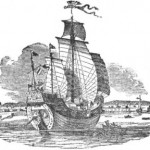 Berlin, May 23 – 25, 2013 Berlin, May 23 – 25, 2013
CONF: The Itineraries of Art Topographies of Artistic Mobility in Europe and Asia 1500-1900
Annual Conference of the DFG Research Unit 1703 Transcultural Negotiations in the Ambits of Art. Comparative Perspectives on Historical Contexts and Contemporary Constellations
Organized by Project Area B Transgressive Itineraries and Transcultural Aesthetics of Artistic Exchange in cooperation with the DFG Research Project Landscape, Canon and Intermediality in Chinese Painting of the 1930s and 1940s
Venues: Freie Universität Berlin, Kunsthistorisches Institut, Koserstraße 20, 14195 Berlin, Hörsaal B (Lecture Hall)Museen Dahlem, Lansstraße 8, 14195 Berlin, Großer Vortragssaal (Large Auditorium)
The conference discusses the interaction between routes as channels of communication and as modes of artistic experience in Europe and . . . → En lire plus
|
Équipe Rédacteur en chef : Olivier Bonfait.
Rédacteurs : Elliot Adam (Moyen Age) ; Nicolas Ballet (XX-XXIe siècles) ; Matthieu Fantoni (musées) ; Antonella Fenech Kroke (bourses) ; Vladimir Nestorov (Lettre mensuelle)
Administrateur web : Matthieu Lett.
ancien éditeur : Pascale Dubus
anciens rédacteurs : Gautier Anceau, Sébastien Bontemps, Damien Bril ; Sébastien Chauffour ; Ludovic Jouvet ; Aude Prigot
|
 Society for Renaissance Studies 6th Biennial Conference Centre for Medieval and Renaissance Culture University of Southampton, 13-15 July 2014
Society for Renaissance Studies 6th Biennial Conference Centre for Medieval and Renaissance Culture University of Southampton, 13-15 July 2014


















